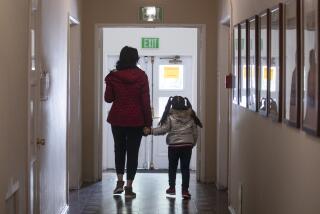‘We do not want another Gabriel Fernandez’ Coronavirus leads to ‘alarming’ drop in child abuse reports

- Share via
On a typical day, up to 1,000 calls and reports of suspected child abuse and neglect flood into the Los Angeles County Sheriff’s Department and Department of Children and Family Services.
Eagle-eyed teachers, doctors, dentists, counselors, coaches — an army of mandated reporters across California — along with security guards, janitors and observant parents typically fill the hotline with reports of suspected child abuse or neglect. Those calls, investigators say, often save lives.
But since the outbreak of the coronavirus has shuttered schools, curtailed medical visits and largely hidden the lives of children behind closed doors, the reports of suspected abuse have dropped by as much as 50%. The drop began almost immediately after California began its stay-at-home orders to prevent the spread of the coronavirus.
“We usually have a lot of eyes and ears out there making sure children are safe. But right now we don’t know what is happening behind closed doors,” Los Angeles County Sheriff Alex Villaneuva said Monday in an interview.
“We do not want another Gabriel Fernandez or another Anthony Avalos,” he said, referring to two young boys who were killed after lengthy and repeated incidents of abuse at home. “That is my worst nightmare.”
In Fernandez’s case, highlighted by The Times and a Netflix series, social workers and sheriff’s deputies failed to act despite repeated reports by a slew of mandated reporters in Palmdale before the 8-year-old succumbed to his horrific injuries in 2013.
In March, the L.A. County Sheriff’s Department documented about 4,200 reports on its suspected-child-abuse reporting system, compared with 5,218 reports the year before. The drop is even more dramatic so far in April, with 662 reports in the first week, compared with 1,352 in 2019.
“These numbers are alarming because of the magnitude of the decline,” Villaneuva said.
Those declines also come as his deputies are responding to an uptick in reports of domestic violence as residents are under stay-at-home orders to prevent the disease’s spread.
In response to the drop in abuse reports, Villanueva said he is launching a plan “to do welfare checks on our most at-risk kids with patrol personnel.” He said he is working with the Special Victims Unit, the Department of Children and Family Services and other stakeholders to develop a way to identify high-risk minors who may not have contact with their schools and then have patrol deputies do some form of a welfare check.
The sheriff, who spent years working the streets and is a veteran of child abuse and neglect investigations, said teachers, daycare workers and janitors are key to investigators when it comes to protecting children.
Without schools, daycare facilities and counseling programs, he said the abuse is likely to still be going on out of sight.
“We are at the mercy of those who report. We need the community to take up the slack,” he said.
Los Angeles Police Deputy Chief Kris Pitcher, who oversees detectives, said in the first month since the stay-at-home order the department has recorded a nearly 53% drop in suspected child abuse reports, with 1,173 from March 17 to April 17, compared with 2,488 for the same period in 2019.
Ginger Pryor, chief deputy director of the Department of Children and Family Services, said the decline in reports is unprecedented and is occurring across the nation as most areas have gone into some form of a shutdown because of the pandemic.
Pryor said child welfare systems rely primarily on mandated reporters in education and secondly from medical professionals. Without school, teachers are not seeing students. And because routine medical visits have been curtailed, doctors and nurses are not seeing children the way they normally do.
Pryor said the child welfare agency is talking to law enforcement about ways they can better keep an eye out for children. But she noted that when it comes to making contact with households, police agencies have more leeway than social workers.
The department’s social workers, she said, are continuing to work on their cases. In some situations, they are making home visits with the appropriate protective equipment. In other cases, they use video to stay in contact with families.
DCFS Director Bobby Cagle said the public can help fill the void.
“I am calling on Los Angeles County residents to be the voice for children who may be experiencing physical abuse, severe food insecurity or other forms of neglect,” he said.
Orange County Dist. Atty. Todd Spitzer warned that the pandemic may serve up victims to predators.
“Given the stay-at-home orders and schools closed, our children and elderly are the most vulnerable as they are potentially in the closest contact now with their abusers,” he said. “When we review how we handled this pandemic, it looks like that will be one of our horror stories.”
Spitzer also called on the public to report any suspicious activity they observe. He said the supermarket may now be where signs of child or elder abuse are spotted.
“It is so much better to call the elder abuse or child abuse hotlines and be wrong than fail to report it at all and something terrible happened,” he said.
The Orange County Social Services Administration has reported a 44% drop in suspected child abuse and neglect compared with a prior month. Deborah Baetz, Social Services Administration director, told county supervisors early this month that teachers are being encouraged to check on students’ well being when in contact with them remotely.
Last week, Gov. Gavin Newsom announced $42 million in funding for children who are at greater risk for abuse or neglect because of the coronavirus pandemic, including about $7 million for social worker overtime and additional outreach.
“Without the structure and safety of school, children — who are already vulnerable to abuse and neglect at home — face a greater threat,” said Newsom, also noting that this month is National Child Abuse Prevention Month. “Similarly, we recognize that many parents who have lost jobs and income due to the COVID-19 pandemic may be feeling overwhelmed and strained.”
Jennifer Braun, president and chief executive of the Alliance for Children’s Rights, said Newsom has taken the right steps with funding for more resources and support for parents. She said anything the government can do to reduce financial stress on parents will also reduce the chances of abuse.
“There is going to be a deluge of abuse reports when this comes to an end,” she said, which may overwhelm the child welfare system.
More to Read
Sign up for Essential California
The most important California stories and recommendations in your inbox every morning.
You may occasionally receive promotional content from the Los Angeles Times.











